Reassuring and easy to use, personal alarms for seniors allow loved ones to maintain their independence. There are a range of devices available. You may be familiar with the concept of a panic alarm, which can either emit a loud siren or send a silent alert to a nominated contact. Panic alarms are usually wearable devices with a simple button to press in an emergency. They're designed for situations such as medical emergencies, personal attacks, intrusions and other types of danger.
A fall detection alarm is different. It's a wearable device with a sensor that automatically alerts a care service provider if it detects a sudden movement change. It doesn't require the wearer to press a button to trigger an alert. Dr Lis Boulton, Health and Care Policy Manager at Age UK, explains how this device works: “The automatic fall detection works through sensors and algorithms within the unit identifying ‘hard falls’ to trigger a call to the emergency resolution team... It can also distinguish these from everyday movements in order to avoid accidentally triggering the system."
Best personal alarms for seniors
There is a distinction between personal alarms and panic alarms. Some types of personal alarms are designed to make everyday life easier. They can set up an alert when it's time to take medication. Additionally, like a Fitbit watch, some models are designed to monitor heart rate. There are also portable devices that use GPS tracking to provide the location of a loved one. If they own a smartphone, it can be installed via an app. Finally, some wearable devices are voice-activated and offer a simple and direct link to a caregiver.
If you know someone with a medical condition or disability or an elderly person who lives alone, a personal alarm can give you peace of mind. In addition to wearable devices, there are home-based alarm systems that work through a landline phone cable or over Wi-Fi. This service generally charges a subscription fee, but it does guarantee 24/7 support. Whatever you decide, it must be easy to use and comfortable for the individual. For more guidance, scroll to the FAQ section below where Dr Boulton explains more about the different types of devices and how they have helped her 89-year-old father live independently.
Personal alarms for seniors
Best location tracker
An AngelSense Personal GPS Tracker allows a loved one to keep their freedom while staying connected to support. You can monitor their whereabouts via your phone as long as they are wearing the small and lightweight tracker. With the subscription, you get unlimited live tracking, 60 minutes per month of speakerphone to talk to the wearer, and customer care. It also has iAlerts that sense unusual routines, such as the wearer being in unexpected places or arriving late at their destination.
The real-time tracking offers peace of mind, showing that the wearer has gone to the correct bus stop or arrived at their social club, for example. Customers like that they can quickly speak to their loved ones through the device. Its battery life is good, but some reviews say the GPS could be more accurate. However, many families have benefited from the alerts and tracking for many different reasons, whether helping a child get to school independently or keeping contact with a loved one with dementia.
Requires a monthly subscription of £29.99 per month.
Pros
- Easy to secure it in a pocket, on a waistband or wear over or under clothes
- Customer care team available
- Safety and independence when out-and-about
- Non-removable belt option
Cons
- Customers say the GPS could be better
Best home pager
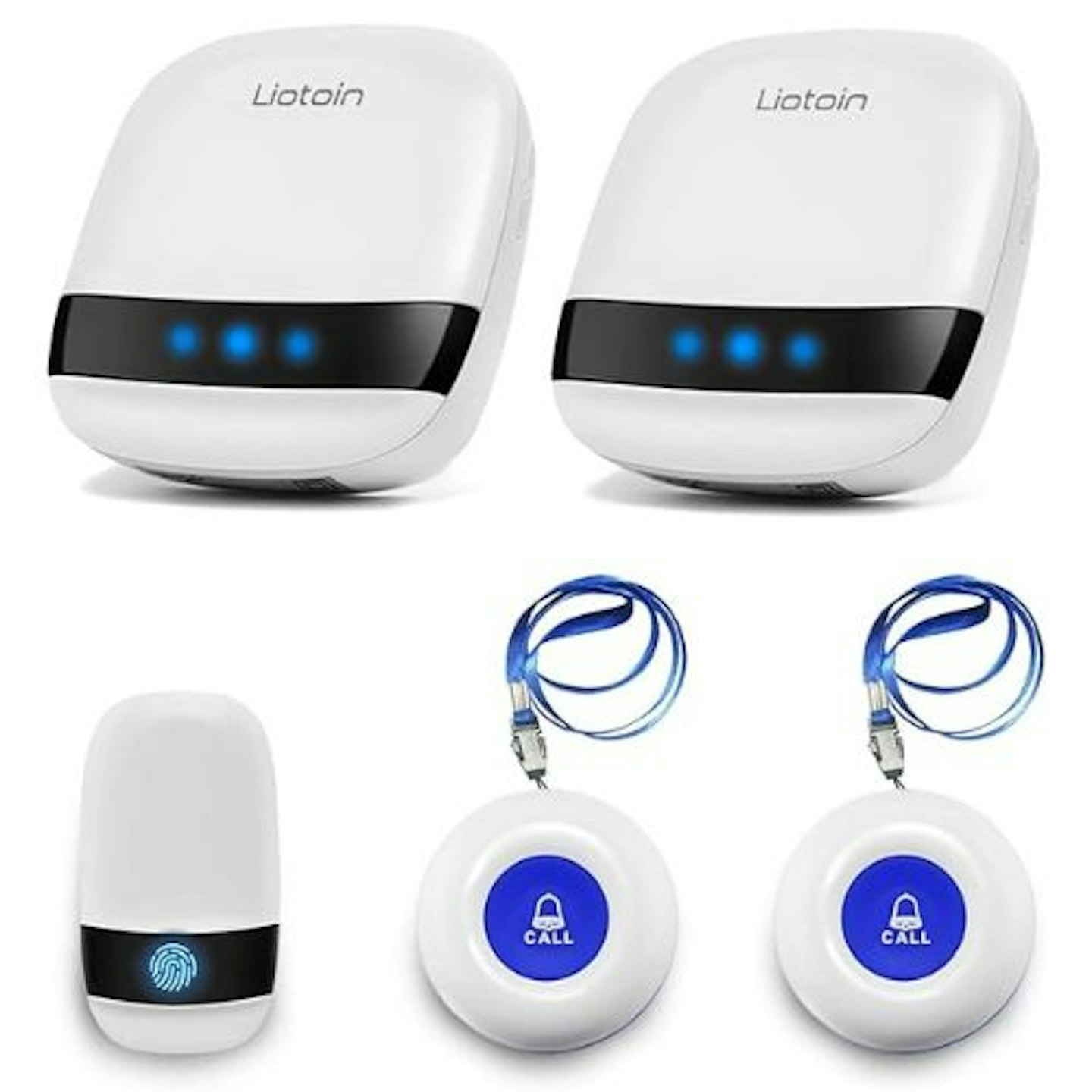 LIOTOIN
LIOTOINIf you live with an elderly or disabled loved one, this pager helps to give you both a bit more freedom. You can carry on with tasks around the home, knowing that if they need help, they can raise the alarm at the press of a button. It's ideal if someone is recovering from an operation or if they're bedridden. If a loved one needs help, they press the button, which raises the alarm at your end. It's light enough to hang around the neck or carry in a pocket. Plus, it has five volume levels and 36 melodies to find a sound that stands out from other household noises.
This is an Amazon's Choice recommended product with positive reviews saying it's a simple plug-in and play system. The batteries are powerful enough to give the transmitter a good signal. However, some customers comment that they receive false alarms, possibly due to interference. Overall, this is a very effective and simple home pager that lets you get on with household tasks and gives the user security, knowing help is always just a button press away.
Pros
- Suitable for people with weak physical strength
- Low power consumption so there's less worry about the battery running out
- Customers say the transmitter has a strong signal
- The call button is waterproof
Cons
- Some customers comment that it can go off for no reason
Best 24/7 personal alarm service
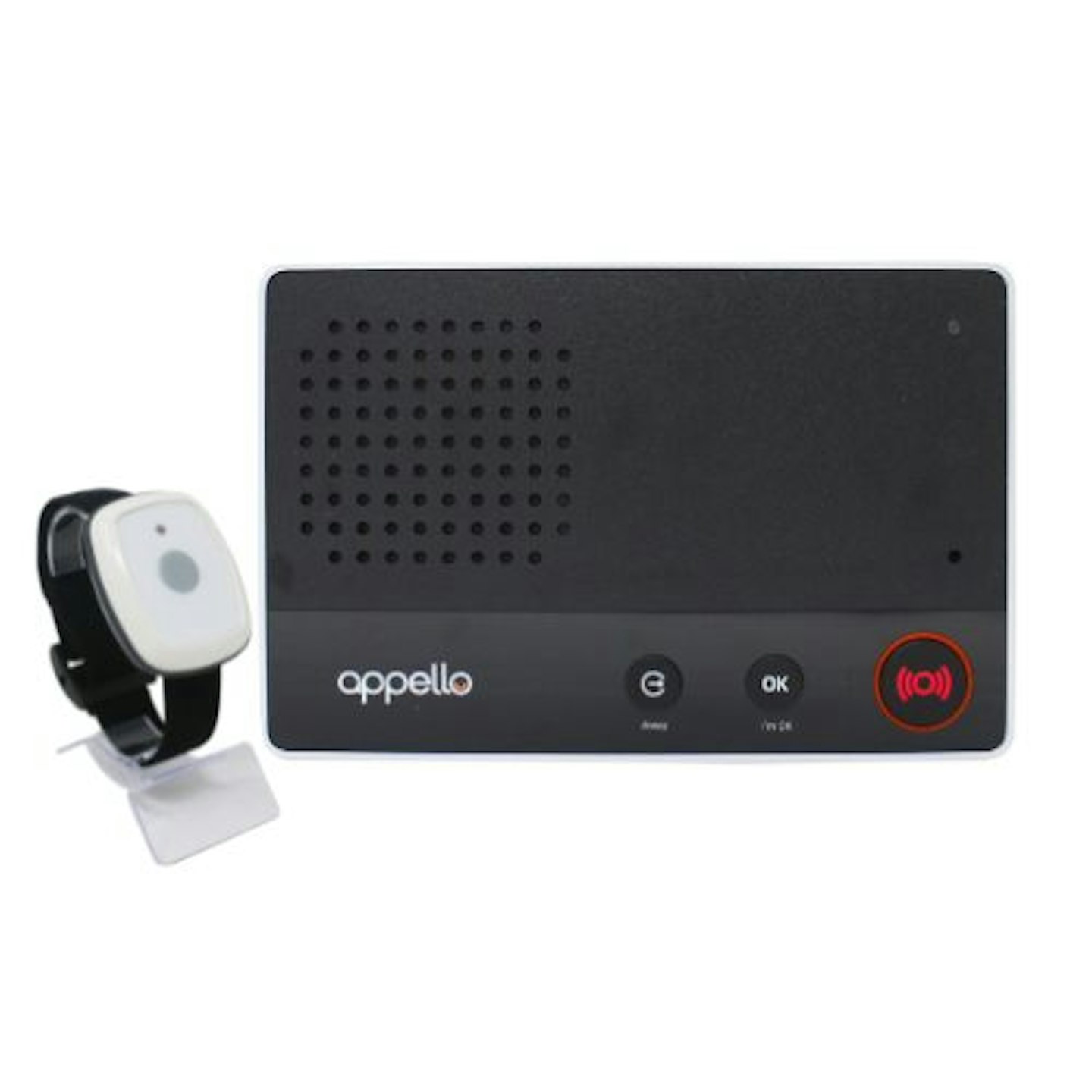 Careline
Carelinewww.careline.co.uk
Enjoy peace of mind knowing that assistance is available at any time. The in-house Careline Care Team offers 24/7 monitoring. With the Careline Complete Personal Alarm Plan, you are taken care of during an emergency. It has an advanced sensor that can detect falls and sends an automatic alert to the Careline365 Care Team, even if a loved one is unconscious or cannot otherwise activate the alarm. As it's a digital service, you won't have to worry about failing phone lines. It has a range of up to 100 metres, meaning a loved one is covered throughout your home and garden. The panic alarm pendant is lightweight and waterproof, and it can be worn around the neck or on a wrist to make it as comfortable as possible.
Customer reviews highlight that you get personal service, and the support team is polite and responsive. They are helpful and explain things clearly. The service costs £24.99 per month (if you pay annually), but it does give peace of mind that loved ones can continue to live independently.
Pros
- Constantly connected to a care team who can alert emergency services, if required
- Automatic fall detection sensor and alert that's not reliant on a landline
- Lightweight and waterproof pendant, can be worn in the shower
- Polite, helpful and responsive customer service
Cons
- There is a monthly charge for the service
Best multi-purpose personal alarm
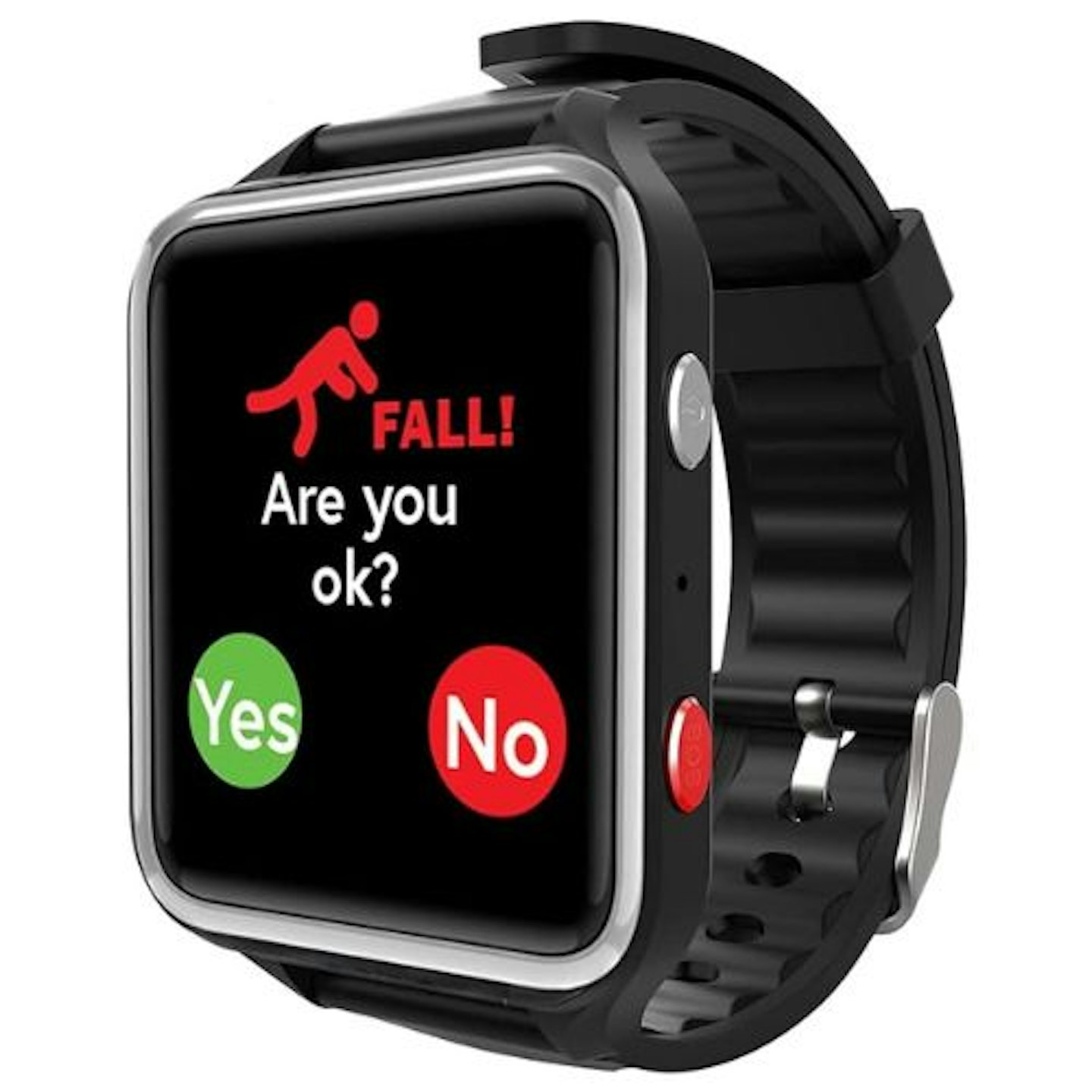 CPR Guardian
CPR GuardianCPR Guardian III is an easy-to-use personal alarm worn as a wristwatch for everyday safety and health monitoring. With its fall alert and GPS tracker, this CPR Guardian III Personal Alarm Watch ensures safety and security for elderly loved ones.
Track their location through the app on your phone, and get real-time updates on their whereabouts. It has a built-in fall alarm alert and two-way calling so that they can contact you quickly. It also has an assist button that alerts emergency services if required. The CPR Guardian III is a smartwatch, too: it tracks steps, monitors heart rate and logs temperature to monitor overall health.
Customer reviews praise the watch for reassuring people to carry on living as usual, with support just a call away. One review advises taking the customer support team up on the offer to set the device up for you, as it's a bit tricky. There are mixed opinions about the product, with some reviews commenting that the watch is rather large and the service is expensive. But for others, this has been the perfect solution for the security and reassurance for them and their loved ones.
Pros
- It works as a smartwatch to monitor health activity
- Alerts loved ones and services, in the event of an emergency
- GPS tracking that can be monitored via an app
- Clear and easy-to-understand display
Cons
- You need to activate the built-in SIM card by subscribing to a service plan
Best alarm for home security
If you're into tech and gadgets, this alarm system may pique your interest because the Yale Sync Smart Home Alarm can be expanded with up to 40 accessories, including this Yale Sync Panic Button. You can monitor your home security from anywhere in the world via the Yale app on a phone, tablet or smartwatch. The app also allows you to arm the alarm and it has a geolocation feature that reminds you to set it when you're about to leave the house.
Primarily used as a home security panic alarm, it'll act as a deterrent for intruders. The handy geolocation feature reminds you to set the alarm when you’re about to leave home. The panic button can be fixed to a wall wherever you see fit or function as a mobile panic alarm from anywhere in your home.
Online reviews comment that it's a basic home panic button, but it really plays a part in a more extensive array of Yale home security devices. Remember that it requires an interest in tech and gadgets to get the most from it.
Pros
- Peace-of-mind home security when you go on holiday
- It can be a fixed or mobile alarm to be used around the home, with a 200m range
- Works with voice assistant smart speakers and smart devices
Cons
- Bear in mind that it's an accessory to be used as part of the Yale Sync & Intruder Alarm Range
Best portable alarm
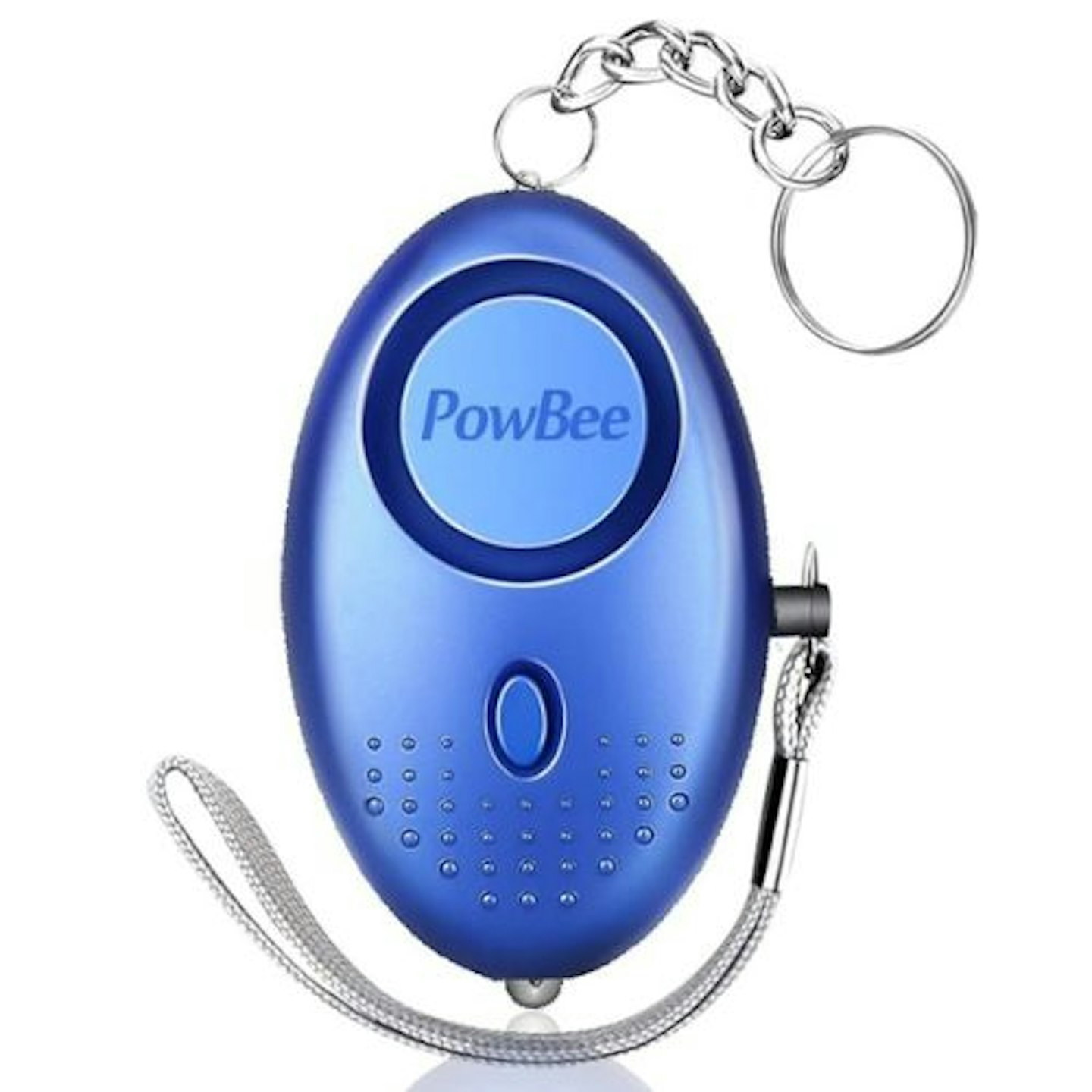 Powerbee
PowerbeeThis personal alarm prioritises a loved one's safety and wellbeing when they are out and about. The PowBee Personal Alarm offers peace of mind that a deterrent to potential attackers is as simple as pressing a button. It is designed to disorientate an attacker and alert people that assistance is needed in a public space. Alternatively, at home it could put off a potential burglar. It's a discreet, stylish and lightweight device that's ideal for taking on dog walks. To activate, simply pull the pin out that's attached to a wrist strap and it will emit a loud whistling sound. In addition, it has a handy LED torch light.
Under £5, this is a super affordable way to give a loved one peace of mind. Customers say they've bought more than one, so the whole family has a device. It gives parents some reassurance when their children walk to school. However, some reviews comment that they were most upset when the alarm went off accidentally in their bag.
Pros
- A loud 150-decibel alarm will attract nearby attention
- Keychain attachment keeps it discreetly within reach
- Has a practical LED torch too
Cons
- It's designed to alert people nearby rather than contacting loved ones remotely
Best value personal alarm service
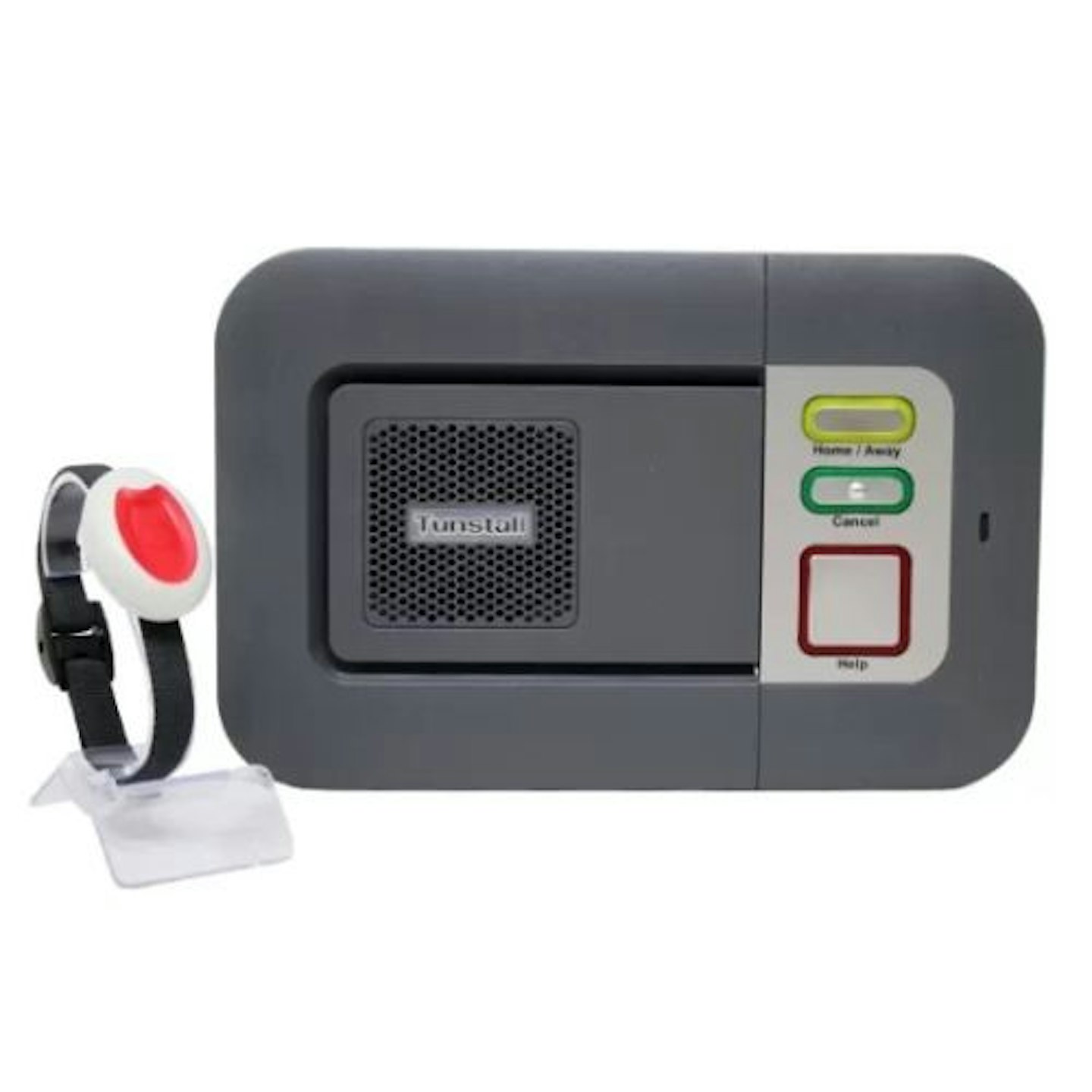 Lifeline Connect 24
Lifeline Connect 24For a trusted personal alarm service that ensures help is always on hand, the Lifeline Personal Alarm and Pendant Monthly Plan is a good value package. This monthly subscription starts from £9.99. It offers 24/7 monitoring from LifeConnect24's in-house response team. This means there is no need to remember phone numbers, and there is always somebody there to answer and alert emergency services if necessary.
The lightweight and waterproof pendant that can be worn around the neck or wrist. The pendant has a seven-year battery life, and it doesn't need charging. The base unit covers a 100m area and has 40 hours of battery backup in case of a mains electric power cut.
A fall detector upgrade is also available, whereby a sensor can detect if a loved one has had a fall, triggering an automatic alert. In addition, you can order a spare pendant, and there is an optional smoke detector alarm.
Customer reviews praise this support package as great for long-term reassurance, meaning an elderly loved one can continue to live in their home. The devices are easy to set up, and the customer service is good.
Just bear in mind that it does require setting up via email, so you'll likely be doing the initial set-up on behalf of an elderly person.
Pros
- A lifetime warranty covers all the equipment
- Easy to use and good customer support
- Good value support package
Cons
- Note that it requires an email to set up
Best for medication reminders
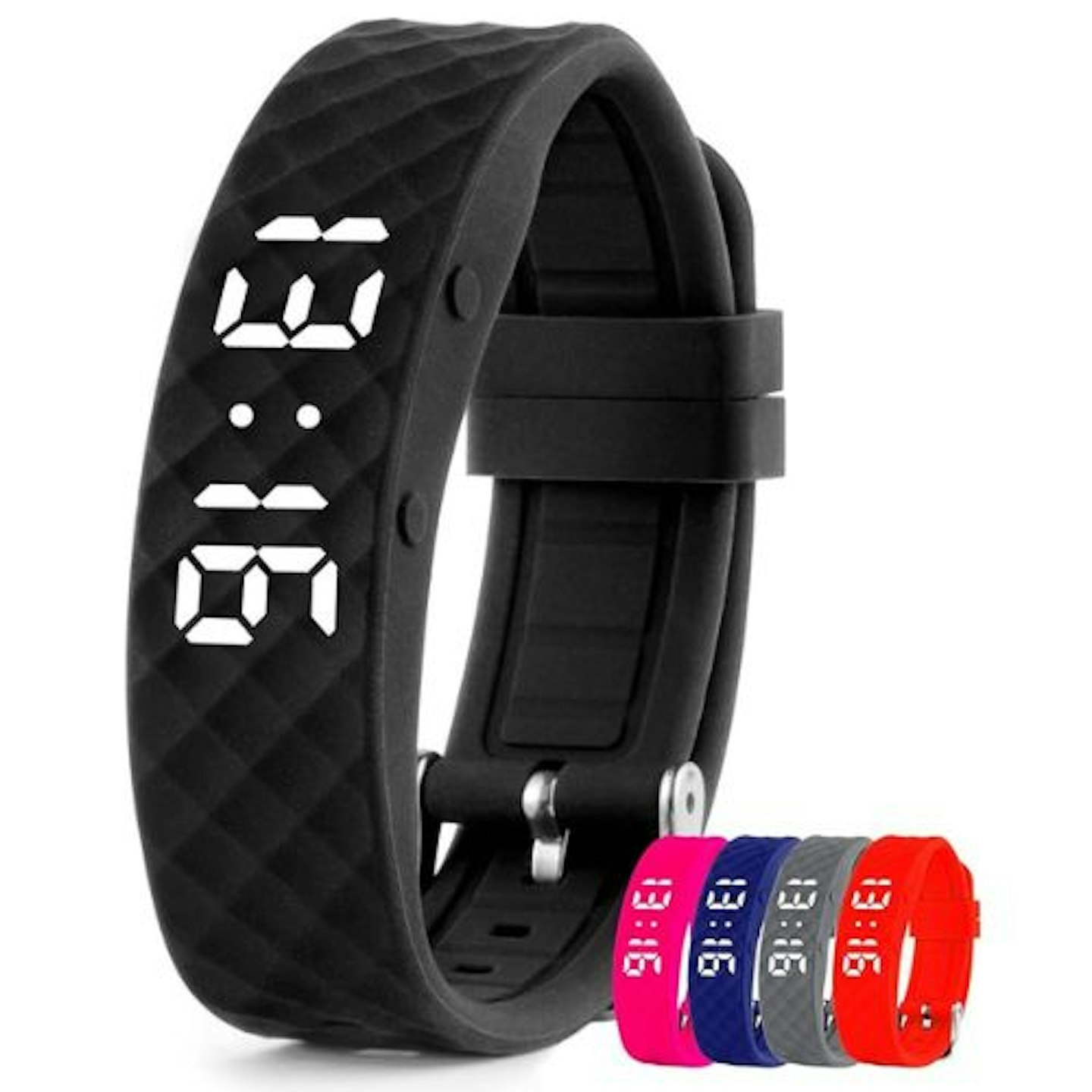 TabTime
TabTime TheTabTime Vibrating Alarm Reminder Watch makes life a bit easier, helping a loved one to take specific pills at the right time. It has ten adjustable vibrating alarms, which can be set throughout the day to remind a loved one to take their medication. Once an alarm is set, it will repeat until it's turned off or when the battery needs recharging. It has a simple two-button design, just like a wristwatch, with a large display that shows the time.
This is an Amazon's Choice recommended product, with over 1,230 reviews and a rating of 4.3 out of 5 for TabTime. Customers like the simplicity of the device. They found the instructions clear and the reminders easy to set. Also, the battery status is accurate, and the battery life is good. But do note that it is not waterproof, so it must sometimes be removed.
Pros
- Available in a range of colours and sizes
- Set up to 10 daily vibrating alarms, which can be discreet silent alarms
- Simply recharges via a USB cable
- Reminds a loved one when to take their medication
Cons
- It is not waterproof
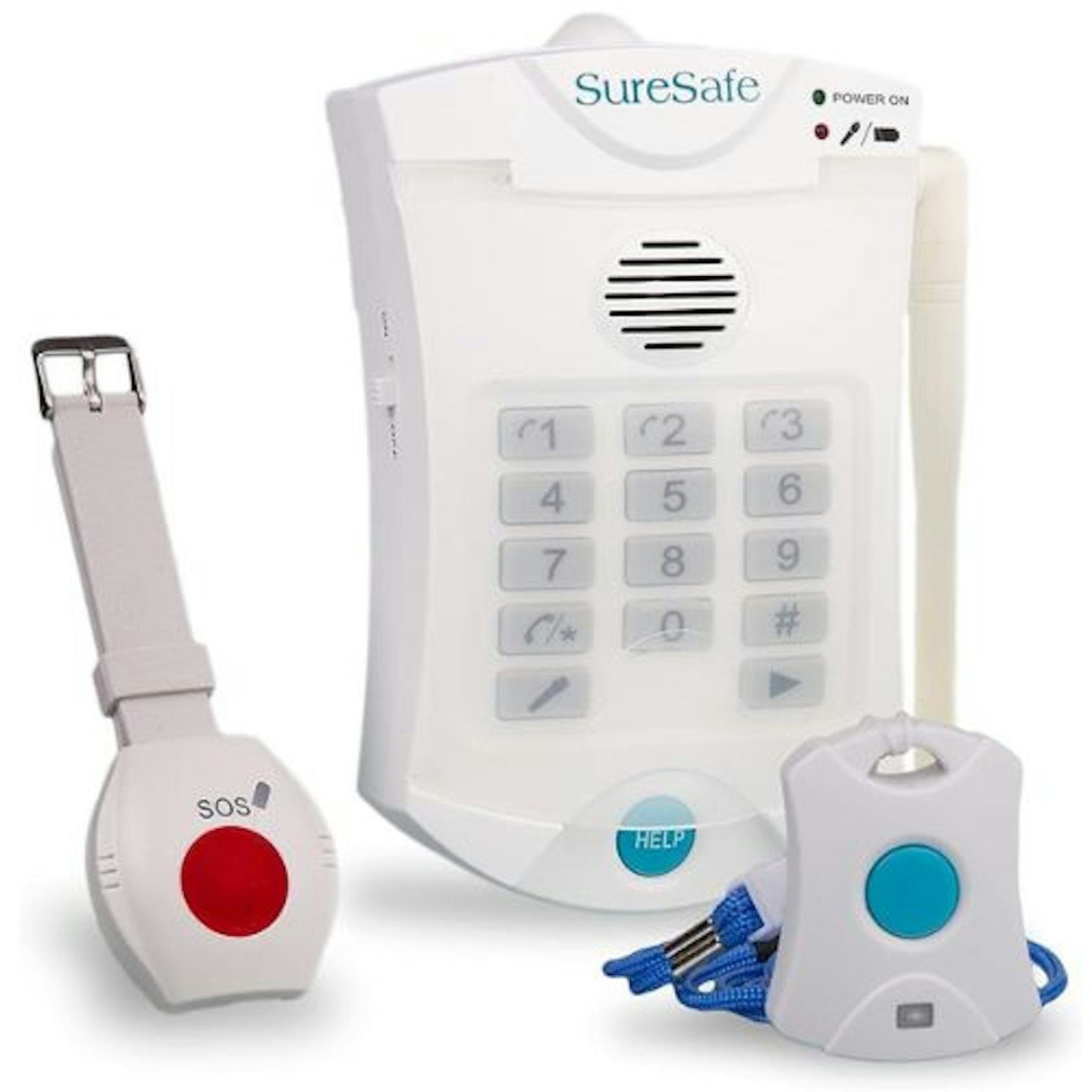 SureSafe
SureSafeA SureSafe Personal Alarm for Elderly can enhance an individual's confidence of knowing they are not alone in an emergency. It's a simple design that may be more familiar to elderly loved ones. It offers two-way communication, whereby you can talk or listen to a loved one. They wear the waterproof pendant all of the time and press for help, when needed. The pendant's SOS button allows a loved one to contact a nominated family member at the touch of a button. If the first nominated contact doesn't answer their phone, the device will automatically dial the second and third contact. It will cycle through the numbers until someone answers. The base unit is powered by mains electricity, but it also takes 4 x AA batteries, which keep it on during a power cut.
Customers like that this is a subscription-free personal alarm. However, it must be noted that they two-way communication is via the base unit, not the pendant. Also, whilst this is currently an effective device, in 2025 landlines will become digital-reliant and it's unclear if this model is future-proof.
Pros
- No monthly payments
- Nominate up to three contacts
- 50-metre range is ideal for home and garden
- The pendant weighs just 29g, and it measures 52 x 42 x 20mm to fit in a pocket
Cons
- Requires a landline
FAQs
Who might benefit from having a personal alarm?
A personal alarm would benefit elderly people who are living alone, individuals with medical conditions, people with mobility issues, and anyone at risk of falls or emergencies. It provides immediate access to help, ensuring safety and peace of mind.
What do personal alarms look like?
There is a range of devices that are simple and effective personal alarms to help a loved one stay safe and independent. The main types include:
Pendants that are small and lightweight, generally worn around the neck.
Wristbands, that resemble a watch or bracelet.
Clip-on devices that attach to belts or clothing.
Keyring alarms that discreetly carried in a pocket, handbag or worn on a belt for easy access.
Smartphone apps installed on phones, tablets or smart watches.
Base units for the home that have large buttons and are stationary.
Ask the expert
Dr Lis Boulton talks about her experience of personal alarms with her elderly father, plus the support services Age UK offer.
What types of personal alarms are available?
“There are a huge range of devices under the umbrella term of personal alarms which can all support us to live well in different ways. I’ve accessed several of these recently, enabling my 89-year-old father to continue living independently whilst giving us both invaluable peace-of-mind.
“Firstly, there’s medication dispenser alarms that flash and beep to remind the user to take their prescribed medication. In my father’s case, all he has to do is tip the tablet into his hand to stop the lights and beeping. He’s not missed a dose in three months.
“There are also alarms to help in the case of a fall. My father has a pendant round his neck which he can use to call for help, as well as an automatic fall detection device which he wears in the form of a strap on his arm – however, to note, some alarms now combine both features in one piece of kit.
“Another type of personal alarm is a vibrating pad, that goes underneath the mattress to alert the user if a smoke alarm goes off. Given my father’s hearing loss, this is potentially lifesaving, and the local Fire Brigade fitted it for free. Similarly, mattress pressure pads can notify carers if someone gets out of bed and doesn’t get back in during the night.
“There are many more devices available if the person is confident using a smartphone or technology. For example, did you know there’s a fall detector in many smartwatches that can alert your family or carers if triggered? However, this does depend on the alert receiver’s device being switched on and close to them at the time."
What does Age UK recommend, and does it offer any services?
“To find out more about alarms that could help you or a loved one, speak to your local Occupational Therapist. Age UK also has more information about the personal alarm options, and Age Co, which is owned by Age UK, sells a range of personal alarms.”
This article contains expert commentary from Dr Lis Boulton, Health and Care Policy Manager at Age UK.
Natalie Knowles is a Homes & Garden Product Writer for Yours, specialising in home appliances. When she's not testing sparkling water makers, she flexes her creative flair as an artist.

